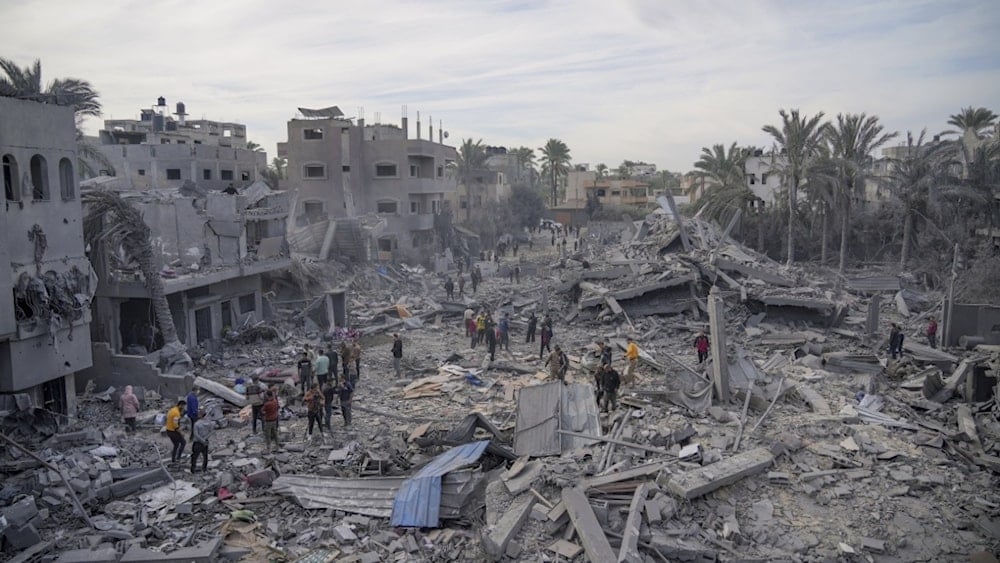UN hopes to repair northern Gaza facilities during ceasefire
Martin Griffiths, UN under-secretary-general for humanitarian affairs and emergency relief coordinator expressed that the UN has a plan that will "hopefully" allow for displaced Gazans to go back to their homes in the north as well as repair facilities in the area.
-

Palestinians look at destruction by the Israeli bombardment of the Gaza Strip, in Deir al Balah on November 22, 2023 (AP)
In an interview with CNN on Wednesday, the UN's humanitarian head stated that the UN hopes to return to northern Gaza to rebuild its facilities under the proposed interim ceasefire.
Several international parties have welcomed the recent announcement regarding a 4-day humanitarian pause with the Israeli occupation, achieved through Qatari and Egyptian mediation efforts after difficult and complex negotiations.
The agreement entails releasing 50 Israeli women and minors (under 19) held captive in Gaza in exchange for the liberation of 150 Palestinian women and minors (under 19) imprisoned in Israeli jails.
Martin Griffiths, UN under-secretary-general for humanitarian affairs and emergency relief coordinator expressed that the UN has a plan that will "hopefully" allow for displaced Gazans to go back to their homes in the north, and "we may be able to go back to the north also to repair facilities."
Griffiths accepted "Israel's" declared intention to move the emphasis of its bombardment to the south, where it had previously directed the Gazan population to go. He characterized the north as "an area of desolation. We fear terribly about this being repeated in the south."
"We need to be prepared for a major humanitarian operation in the south and we need to grab every moment of any pause that comes our way," he remarked.
He confirmed that UNRWA will continue to do its utmost to give help to Palestinians in both the north and south, stressing that despite sustaining more than 100 losses in the war, it still had 5,000 workers operating on the ground. He indicated that the UN was planning to convert schools into distribution hubs.
The conditions of the ceasefire are as follows:
On the military level:
- The cessation of all hostilities from both sides.
- A halt of all Israeli military actions in all areas of the Gaza Strip.
- The cessation of Israeli military vehicle movement in the Gaza Strip.
- Israeli military overflights in the southern Gaza Strip will be halted for four consecutive days.
- Israeli military overflights in the northern Gaza Strip will be limited to six hours daily.
On the humanitarian level:
- Hundreds of trucks carrying humanitarian, relief, and medical aid will reach all areas of the Gaza Strip without exception.
- Fuel deliveries will be allowed into the Gaza Strip
On Monday, the UN warned that a lack of fuel, a shortage of water, and deteriorating sanitation in Gaza, along with attacks on healthcare facilities and mass displacement, have created a "perfect storm for tragedy."
UN Spokesperson James Elder said, "If children's access to water and sanitation in Gaza continue to be restricted and insufficient, we will see a tragic -- yet entirely avoidable -- surge in the number of children dying."
Elder stated that the daily minimum required in an emergency is 15 liters (four gallons) of water per person, stressing that in some areas of Gaza, just three liters per day are accessible, and none on other days.
He called it the "perfect storm for the spread of disease," emphasizing a "desperate lack of water, fecal matter is strewn across densely-populated settlements (and) an unacceptable lack of latrines."

 3 Min Read
3 Min Read








